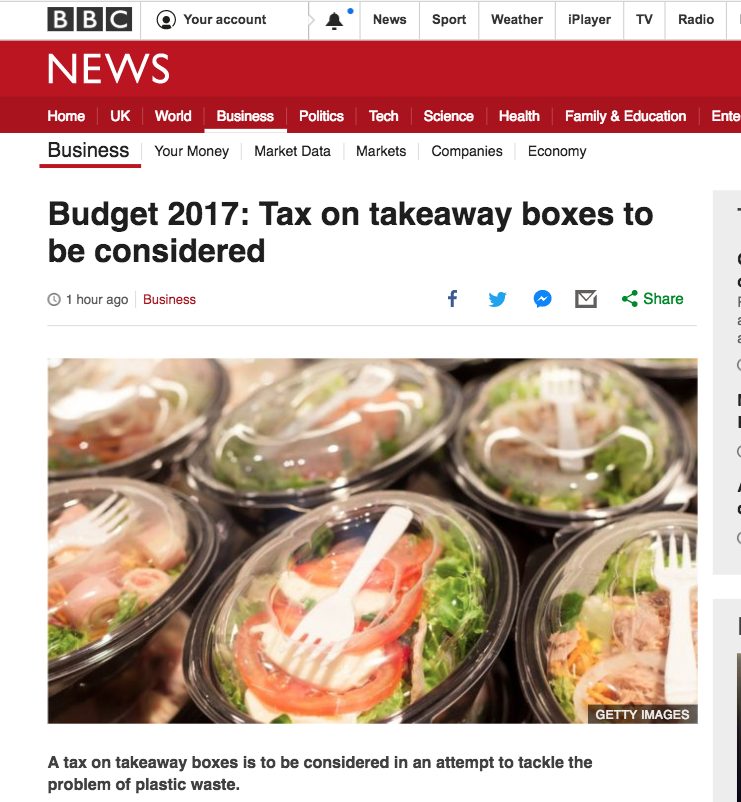The Plastic Budget
It’s the most exciting time
of the year, isn’t it? Christmas is rapidly approaching; we’ve just reached the
midpoint of Term. However, the most exciting day of all is still yet to come: Wednesday’s 2017 Annual Budget.
I know, I feel it too. The excitement is
too much. Let me explain why it’s an exciting day. The reason behind writing this blog post about the 2017 Budget, amidst all the clambering about Brexit and political futures (sorry Theresa),
follows the news
about the introduction of new taxes to limit disposability and single-use of plastics.
The proposal to implement a
plastic tax, follows the recent uproar in the last few weeks after the BBC series Blue Planet II
highlighted the devastating impacts of plastic within our marine environments.
Figure 1: Plastic tax headlines (Source: BBC News)
How
the tax works?
The tax is still speculative
until announced next week. However, the proposed ‘plastic tax’ is designed to
operate through imposing a tax or charge upon single-use items, such as coffee cups or takeaway boxes, as to influence ourpurchasing decisions. In turn the presumed, limited single-use of
plastics should result in lowered plastic debris, mitigating against the negative
impacts across both marine and terrestrial environments. The negative
impacts of plastic within global marine environments is raised within this excellent blog post. The
proposed plastic tax follows from the successful implementation of the 5p charge upon plastic bags within supermarkets. Recent evidence suggests that there has been
an 85% reduction in the use of plastic bags, following the imposition of the charge, over the course
of 6-months.
The tax solution builds upon
tackling plastic production trends and the disposability culture within our society. Hopefully, the Chancellor will introduce
this radical tax policy, which could generate some desperately needed revenue and protect marine environments for the future.


Really interesting read - I am really intrigued to see how the 'takeaway' tax would work in operation. I better buy my 'keep-cup' asap
ReplyDeleteHello Louise! Thanks for commenting! It’s going to be interesting to see how the tax would work in operation. However, we have cause for optimism following the success of the 5p levy charge on plastic bags! I’ll join you with the non-disposable coffee flask! Interestingly, there was an article this morning about the implementation of a similar ‘plastic tax’, if you’re interested:
Deletehttps://www.theguardian.com/environment/2018/jan/05/mps-25p-charge-takeaway-coffee-cups-possible-ban-environmental-audit-committee-report
Hey Issy! Nice summary of the plastic tax- obvs I too was *desperately* organising my social calendar around the release of the National Budget, such was my excitement.
ReplyDeleteI honestly think that this plastic tax couldn't come soon enough. My question to you is, do you think that this measure is enough, or do you think we need to implement other measures, such as education in schools about the effects of plastics, or technologies to clean our earth of already dumped plastics?
There is a risk that introducing a monetary disincentive will hit poorer people harder, and not really affect the wealthy (who are more likely to be able to afford a more consumerist lifestyle).
What solutions do you see?
Hey Mari (Issy)! Thanks for the comments! I’m glad someone else was truly captivated by the Socratic wonder of the Annual Budget! To be honest, I’m surprised it’s not the highlight of most people’s social calendars?
DeleteI think the plastic tax is an interesting starting point for tackling the plastic endemic, building from the 5p plastic bag levy which had tremendous success in recent years. I completely agree with your proposition, creating awareness regarding the plastic implications within our terrestrial and marine environments is the first step towards resolving our dependence! Secondly, the need for innovative technologies and solutions to clean our environments of plastic pollution are desperately needed!
I recognise however, the shortcomings of the plastic tax involve disproportional economic consequences for often the most poorest members of our society. Incidentally, in a previous blog, there is an interesting TED talk which alludes to the ‘economic injustice of plastic’, if you’re interested:
https://takingtheplastic.blogspot.co.uk/2017/10/the-economic-injustice-of-plastic.html
Currently, I foresee greater state and market interventions as solutions towards tackling the plastic endemic within our environment.